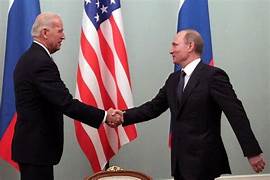New concepts on Russia-Ukraine war continue to emerge, “losing war” and “Not winning the war” have surfaced recently. Engaging in a losing war means persisting in conflict despite the inevitable defeat, a path the US seems to be following, risking significant damage to its image and economy. In contrast, not winning the war suggests pursuing a negotiated settlement between the belligerents by allowing Russia to control over occupied territory.
Opting for not to win approach offers a less tarnished image for the US, but its ego prevents such a pragmatic approach. The reluctance to pursue a more diplomatic solution underscores the complexities of geopolitical strategies and present the challenges of reconciling wish with practicality, as continuing war with Russia will only result in defeat of Ukraine and NATO. In the realm of international relations, finding a balance between asserting dominance and seeking compromise is often a delicate and nuanced task, which require careful navigation to avoid escalating tensions and achieving mutually beneficial outcomes.
In the scenario of “not winning,” a negotiated settlement will be proposed, wherein Ukraine concedes captured territory to Russia and accedes to some of Russia’s security demands, notably rejecting NATO membership. On the other hand, the “losing” scenario unfolds with the continuation of escalating the conflict by providing military support to Ukraine, foretelling a more dire outcome for the US and NATO.
The potential aftermath of losing the war looms large, with the credibility of the US and NATO hanging in the balance. Colonel Daniel Davis weighs in, and cautioned against disregarding the realities of the situation and advocated for a shift in strategy to avoid more significant defeat that would damage US credibility.
The strategic impact of a US defeat by Russia would reverberate globally, significantly undercutting the “rules-based order” and symbolizing the decline of the Americans. Despite the gravity of the situation, there appears to be a lack of substantial debate among US foreign policy elites, who seem entrenched in pursuing maximalist objectives.
NATO’s stance is firmly tied to Ukraine’s victory against Russia, with leaders insisting on the full territorial reconstitution of Ukraine to safeguard the alliance’s credibility. NATO, now is not led by real-politik thinking but by ego that they need to win the war, the truth is they want to win the war, but it will remain only a wish as they can’t outmatch Russian power.
French President Macron emphasized on the existential threat the war poses to Europe, warning of the dire consequences of a Russian victory on Europe’s credibility. Critiques are leveled against maximalist views of the west that advocate for Russia’s total defeat, which is detached from the realities on ground.
The current Western strategy is criticized for its lack of a coherent endgame, primarily focusing on aiding Ukraine without a clear plan to bring an end to the conflict. Professor Mark Episkopos proposed a more pragmatic approach, acknowledging the impracticality of seeking Russia’s total defeat.
Concerns are raised about the influence of war hawks in US policy circles, who advocate for escalating military force despite the complexities of the conflict, they are foolishly focusing on brinkmanship approach.
It is imperative to underscore the potential vulnerability of NATO forces if they get directly engaged with Russian forces in Ukraine. NATO’s military weaknesses like insufficient capacity to sustain a significant military presence in Ukraine and European forces ill-prepared for high-intensity warfare, are solid reason that tells us, that NATO will not be able to win a war. Military superiority of Russian forces over US forces in Europe, are raising concerns in NATO about the capability gap.
Extensive wargaming and analysis indicate Russia’s capability to swiftly advance in the Baltics, posing a formidable challenge to NATO forces. NATO’s infrastructure deficiencies further compound the challenges, with inadequate logistics and support for a substantial defensive effort in Europe. Despite the looming threats, there has been no meaningful increase in Western armaments production, leaving the West ill-prepared for prolonged conflict. West is militarily weak compared to Russia, so the challenges it faces in confronting Russian aggression are huge.
In conclusion, it is important to underscores the futility of continuing the current strategy, advocating for a realistic and pragmatic approach to end the war is important rather than pursuing unattainable maximalist goals.
